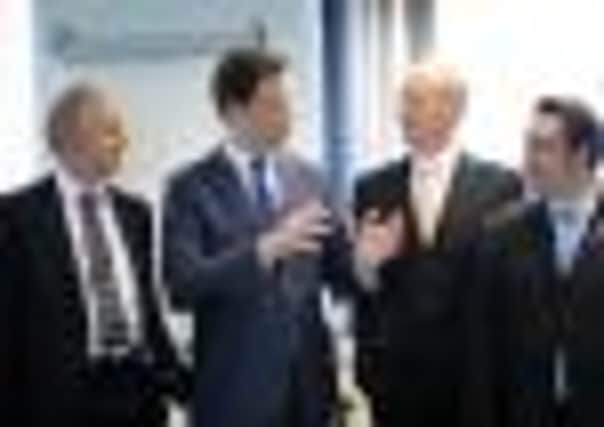Green light for Leeds’s electric trolleybus scheme


Civic leaders hailed “the first step to a 21st century transport system” after Yorkshire-born Transport Secretary Justine Greening ended countless years of obstruction and denial from Whitehall by signing off the UK’s first modern-day trolleybus system for the city.
The decision means that by 2018, sleek electric buses powered by overhead wires will be running across the city on a north/south route every six minutes during peak times, linking with new Park and Ride sites at either edge.
Advertisement
Hide AdAdvertisement
Hide AdIt will finally end Leeds’s unwanted status as the largest city in western Europe without a modern transport system, and follows years of planning and lobbying by local politicians after their bid for a ‘super-tram’ network was turned down in 2005.


Leeds City Council, which is putting up £77m of the total cost, said 4,000 jobs will be created by the Next-Generation Transport (NGT) system, with further knock-on effects for the wider economy.
Chief executive Tom Riordan said: “This is fantastic news.
“We have been through all the false dawns before with super-tram, and this has been long in the making. It is a really important moment for the city and the wider city region.
“It is a sign of our success that we have got this, and we deserve it – now we have to make it work.
Advertisement
Hide AdAdvertisement
Hide Ad“It will make a real difference to linking up the parts of the city that need it to the city centre.”
The announcement was made by Deputy Prime Minister Nick Clegg yesterday as he visited Leeds to unveil its much-vaunted City Deal, devolving new powers and funding to the region.
Ironically, a key element of the new deal will mean this is the final time Leeds will have to go cap-in-hand to Whitehall to request funding for transport schemes.
“What we are doing is something that Labour failed to do for 13 years, not only the £250m commitment to trolley bus – the first in the country for many years – but also announcing that the councils here will be able to share a billion-pound transport investment fund,” Mr Clegg said.
Advertisement
Hide AdAdvertisement
Hide AdTrolleybuses have not operated in Yorkshire since the final system in Bradford was closed nearly 40 years ago.
The modern versions still run on roads rather than tracks or rails, and use standard rubber tyres, but the overhead wires which power them allow them to operate silently, accelerate smoothly and emit little pollution.
James Lewis, chairman of West Yorkshire transport body Metro, said they will be “job-creating, economy-boosting, environment-improving, time-saving, carbon-reducing, congestion-busting.”
The new trolleybuses will run across a nine-mile stretch of the city, with 40 per cent of the journeys in dedicated lanes.
Advertisement
Hide AdAdvertisement
Hide AdThe northern route will begin at Holt Park, call in at a new Park and Ride site by the outer ring road, and travel into Leeds along the A66, through Headingley and past both universities.
The southern route will start at another new Park and Ride site near the intersection for the M1 and the M621, and will arrow into the city through Hunslet and Clarence Dock.
Business leaders warmly welcomed the announcement and called for it to be the first step in a wider transport revolution.
Mark Goldstone of the Leeds, York and North Yorkshire Chamber of Commerce said: “We see this as the first plank of a city region-wide integrated transport system, and will continue to push for a system befitting a 21st-century location.”
Advertisement
Hide AdAdvertisement
Hide AdCity MPs also hailed the news, with Pudsey’s Stuart Andrew describing trolleybuses as “a good fit for the city.”
Elmet and Rothwell’s Alec Shelbrooke added: “This large scale infrastructure project is an unprecedented boost for the regional economy, and will move us a step closer to addressing the North-South divide.”